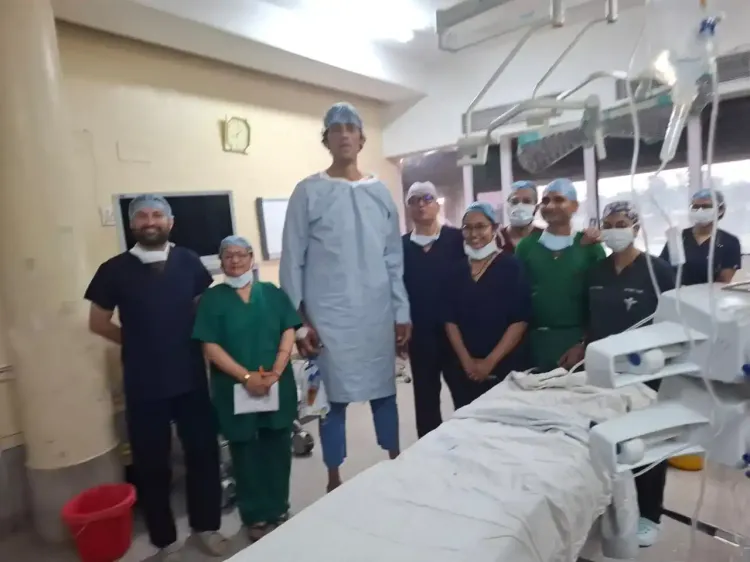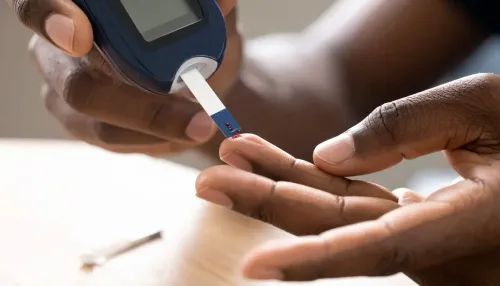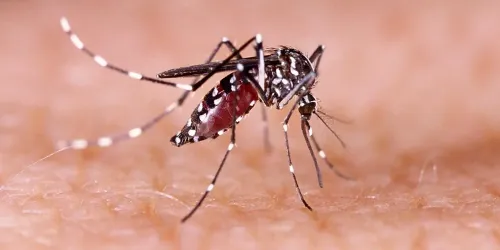Has the Tallest Man Underwent Surgery to Treat a Pituitary Tumor at PGIMER?

Synopsis
Key Takeaways
- PGIMER has treated over 100 pituitary tumor cases.
- Innovative endoscopic transnasal approach minimizes surgical risks.
- Successful treatment of a patient measuring 7 feet 7 inches.
- Importance of early diagnosis in pituitary disorders.
- Collaboration among various medical teams ensures optimal patient care.
Chandigarh, May 26 (NationPress) In a remarkable achievement, the Department of Neurosurgery at PGIMER in Chandigarh has successfully managed over 100 cases of pituitary tumors, including one of the tallest recorded patients measuring 7 feet 7 inches.
Acromegaly, a hormonal disorder arising from functional pituitary adenomas, is treated using the endoscopic transnasal approach, a minimally invasive method that eliminates the need for any external head incision.
The dedicated neurosurgery team, under the guidance of Dr. Rajesh Chhabra, Dr. Apinderpreet Singh, and Dr. Shilpi Bose, has accomplished this feat with invaluable assistance from the neuroanaesthesia team, led by Dr. Rajeev Chauhan, along with Dr. Ikjot and Dr. Drishti Parekh.
The operation theatre team, including OT technician Gurpreet Singh, played a vital role in ensuring the procedures were conducted safely and smoothly, as noted by the Postgraduate Institute of Medical Education and Research (PGIMER) on Monday.
Prof. Vivek Lal, Director of PGIMER, praised this collaborative effort, stating, “The successful treatment of over 100 complex pituitary tumor cases, including one of the tallest patients recorded at 7 feet 7 inches, showcases our clinical excellence, precision, and teamwork at PGIMER.
“These results reinforce our steadfast commitment to providing the highest standard of care through innovation and compassion.”
Highlighting the significance of this surgical approach, PGIMER recently treated an extraordinary case involving a young man who had attained a height of 7 feet 7 inches, a rare manifestation of acromegaly due to uncontrolled growth hormone secretion.
The patient experienced increasing joint pain, vision problems, and challenges in daily activities, eventually undergoing successful tumor removal via the scarless transnasal route.
Following the surgery, his hormone levels began to normalize, and his symptoms showed significant improvement within weeks, according to hospital reports.
Dr. Rajeev Chauhan, Additional Professor in the Department of Anesthesia and Intensive Care, explained, “This was the tallest patient ever operated on at PGIMER. His exceptional height and weight presented multiple anesthesia challenges, particularly concerning airway access and positioning. We conducted a full rehearsal the day prior to surgery to adjust our OT setup, ensuring safety and precision during the procedure. It was a collaborative effort that demonstrates PGIMER’s readiness to tackle even the rarest medical scenarios.”
Dr. Rajesh Chhabra, Professor in the Department of Neurosurgery, elaborated on the medical condition, stating, “Functional pituitary adenomas are benign tumors of the pituitary gland that produce excess hormones, disrupting the body’s hormonal equilibrium.
“Depending on the hormone involved, these can lead to various symptoms, from abnormal growth of hands and feet (acromegaly) to weight gain and facial puffiness (Cushing’s disease), and breast discharge with irregular periods in women who are not pregnant (prolactinoma).
“Often silent in their early stages, these tumors can result in serious complications if not diagnosed and treated promptly.”
PGIMER continues to excel in diagnosing and treating complex neuroendocrine conditions. With timely medical or surgical intervention, including advanced options like Gamma Knife radiosurgery, patients can anticipate full recovery and an improved quality of life. Early awareness is crucial. Individuals experiencing unusual growth patterns, menstrual irregularities, or unexplained weight gain should seek medical evaluation to rule out hormonal imbalances and pituitary disorders, Dr. Chhabra advised.









